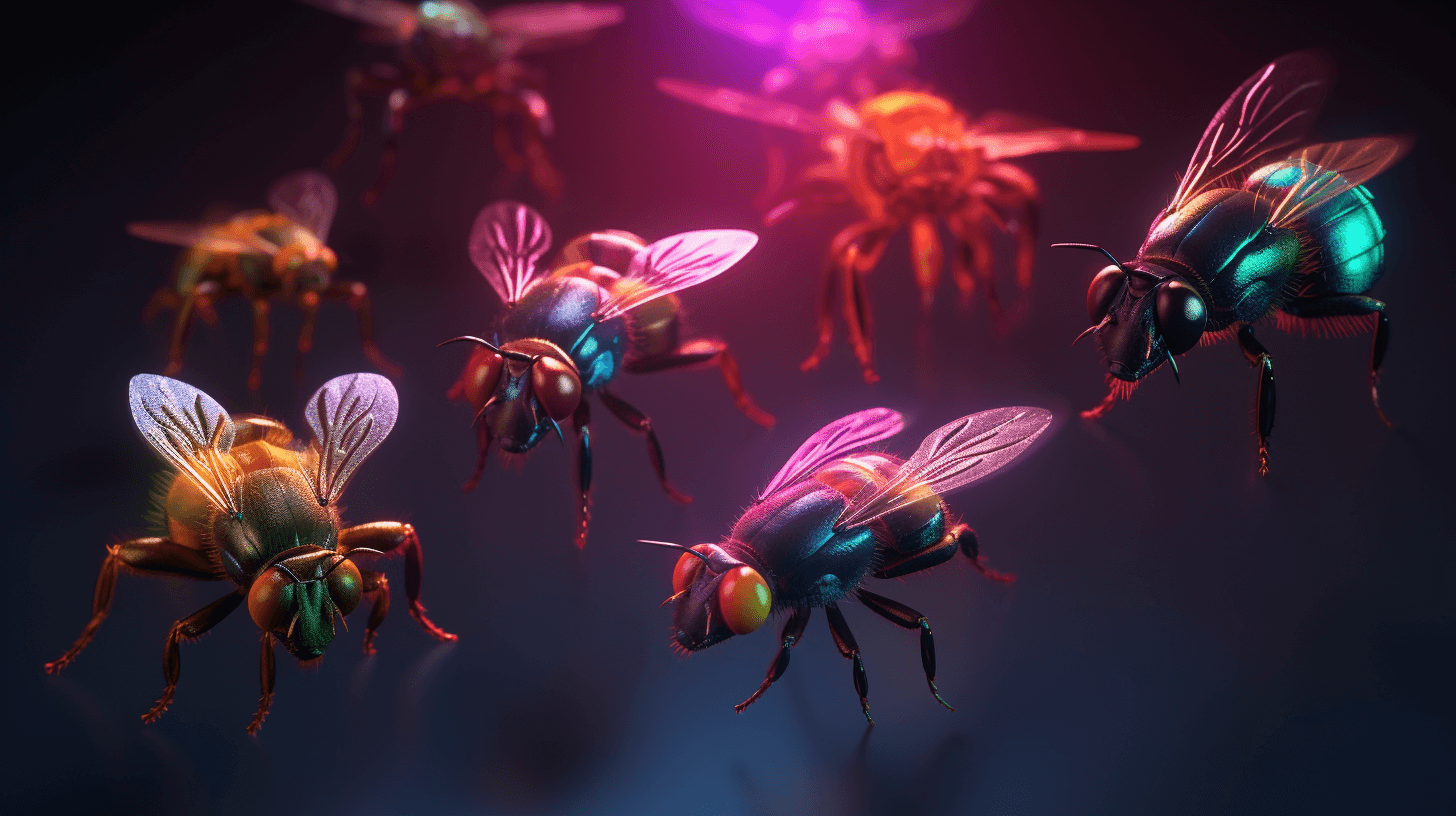🪰👀⌛ Wen Fly See Death, Dem Age Fastah!
One groundbreaking study wen drop, showin’ us dat flies get dis crazy power fo’ age at lightning speed wen dey lay eyes on oddah flies wen drop dead. Dis kine of discovery get us thinkin’ ’bout how da brain’s perception can actually affect da physical body. Dr. Christi Gendron, da genius neurobiologist from da University of Michigan, wen spill da beans, sayin’, “I stay get one special spot in da fly hell fo’ dis.” 🔬🤯🔍
Dr. Gendron, who stay one real kolohe scientist, wen earn her spot by pokin’ ’round and studyin’ how fruit flies react wen dey come face to face wit da Grim Reaper. Fo’ dis study on “wen see death,” you gotta have some fly corpses. Dr. Gendron and her crew wen get creative and use starvation fo’ get dem fly cadavers. 😷🍎💀
Dis kinda morbid work, which wen come out in da journal PLOS Biology, wen reveal dat flies get groups of neurons inside deir lil’ heads dat make dem age like dey on fast forward aftah dey wen witness da death of anotha fly. Dis kinda info goin’ help dem scientists figgah out how da brain takes wat it see and turn ’em into real physical changes in da body. 🧠⏩🕰️
All kine animals in da world know somethin’ ’bout death. Elephants mourn fo’ da ones dey lose; crows even hold “funerals”; and fo’ bees, ants, and termites, cleanin’ up da dead bodies stay one specialized job dat only certain members handle. We all got our own way fo’ dealin’ wit death. 🐘🦅🐜🪦
But now, let’s focus back on our fly story. Dr. Gendron and Scott Pletcher, who one smart biologist at da University of Michigan, wen accidentally stumble upon dis findin’. Dey was actually tryin’ fo’ see if flies would react differently or have some kinda change in deir bodies aftah bein’ ’round sick flies. Dey was thinkin’ like, “Eh, maybe dey get strong immune systems or somethin’.” But da real shocka came when da flies dat dey infected ended up dead. Dr. Pletcher wen say, “We only saw reactions from da flies dat wen go kaput.” 🦟🤔💉💀
And here’s where tings get even more wild. Dr. Pletcher and Dr. Gendron wen find out dat da flies dat wen see da corpses was actually avoided by oddah flies, like dey was marked wit da seal of death (how dis work still one big mystery). Plus, dese “corpse-viewers” wen start to lose stored fat super quick and kick da bucket sooner den da flies who no get traumatized. It’s like dey was cursed or somethin’. 😱🚫🍩💀
Dr. Pletcher wen add, “Our lab stay always interested in how da brain control da agin’ process.” So, dey wen decide fo’ dig deepah and try fo’ undahstand how da flies’ senses of death translate into a shorter lifespan. Da two scientists wen lock up da livin’ flies in vials wit dead fly bodies fo’ two whole days. While dey was at it, dey kept an eye on da fly brains usin’ one fluorescent green dye. When dey wen open up dose death-exposed flies, dey wen see da activity happenin’ in da ellipsoid body, which da place where all da sensory info get processed. 👀🧪💚🧠
But wait, there’s more! Dr. Gendron and Dr. Pletcher wen even pinpoint da key neurons in dat ellipsoid body. When dey wen shut off dose neurons, it’s like da flies no even care if dey wen see dead flies or not—they wen live just like da flies who no get traumatized. But den, when dey wen activate dose neuron clusters, da flies wen meet dere makah even quickah, even if dey nevah seen a dead fly in deir short lives. Dr. Marc Tatar, one biologist from Brown University who no have any part in dis study, wen say, “Dey show dat one special set of neurons wit serotonin receptors get used by da living flies fo’ recognize dead flies. Das da beauty of dis paper.” 🧬🔌🪰💡
Now, we still no exactly sure why seein’ dead flies make da livin’ ones rush to join ’em. Dr. Tatar tink maybe da dead flies act as one warnin’ sign fo’ da ones still alive, so dey try fo’ put all deir energy into makin’ babies instead of livin’ longer. One oddah study from 2022 wen report dat female flies exposed to dead bodies laid mo’ eggs, but no affect deir lifespan. Dr. Pletcher say da othah study probably use “less intense” dead bodies, so maybe dat’s why da results no match up. In deir experiments, Dr. Pletcher and Dr. Gendron no see no increase in reproduction from da death-exposed flies. 🥚📉🤷♂️🐝
Anothah theory is dat da shorter lifespan come from da stress caused by witnessin’ death. We all know dat chronic stress in animals cause all kinds of health problems and make ’em live shortah lives. Even flies get stress response, you know. Dr. Pletcher give one example, sayin’, “If we suddenly find ourselves surrounded by dead humans, das gonna be one big stressah.” 🤯😰🚫💀
Da researchers hope dat dey can take a biggah look at deir findings and see how oddah social interactions, or da lack of ’em, affect da agin’ process in flies. Plus, Dr. Tatar say we need fo’ study fruit flies in deir natural habitats instead of jus’ lockin’ ’em up in da lab. He say, “Dose flies been livin’ in da lab fo’ 120 years. We need fo’ start thinkin’ ’bout ’em as free, natural bugs, not jus’ genetic experiments.” 🌳🌿🏞️🪰
So, now we know dat flies get dis superpower to age fastah wen dey come face to face wit da dead. It’s like dey carry dis secret burden aftah witnessin’ death, and it changes ’em on da inside. But we still gotta keep diggin’ and learnin’ more ’bout dis fly phenomenon. Who knew flies could be so deep? 🪰🌀💡🔍
NOW IN ENGLISH
🪰👀⌛ When Flies See Death, They Age Faster!
One groundbreaking study was recently released, showing us that flies possess this astonishing ability to age rapidly when they encounter other flies that have died. This particular discovery has sparked contemplation about how the brain’s perception can truly impact the physical body. Dr. Christi Gendron, the brilliant neurobiologist from the University of Michigan, disclosed, “I must have a special place in the fly underworld for this.” 🔬🤯🔍
Dr. Gendron, a truly innovative scientist, earned her reputation by investigating how fruit flies react when they come face to face with the Grim Reaper. For this “when-see-death” study, fly cadavers were essential. Dr. Gendron and her team devised a clever approach, employing starvation to obtain these fly corpses. 😷🍎💀
This rather macabre research, which was published in the journal PLOS Biology, unveiled that flies possess clusters of neurons within their tiny heads that accelerate their aging process after witnessing the demise of another fly. This information will aid scientists in comprehending how the brain translates visual stimuli into tangible physical changes in the body. 🧠⏩🕰️
Animals of all kinds around the world have an understanding of death. Elephants mourn their lost ones, crows even hold “funerals,” and bees, ants, and termites have specialized members dedicated to cleaning up deceased bodies. Each species has its own way of coping with death. 🐘🦅🐜🪦
But now, let’s return our focus to the story of flies. Dr. Gendron and Scott Pletcher, an intelligent biologist at the University of Michigan, accidentally stumbled upon this revelation. They were originally investigating whether flies would react differently or experience any bodily changes after being around sick flies. They pondered, “Perhaps they have robust immune systems or something.” However, the real surprise came when the flies they infected ended up dead. Dr. Pletcher remarked, “We only observed reactions from the flies that met their demise.” 🦟🤔💉💀
And here’s where things become even more astonishing. Dr. Pletcher and Dr. Gendron discovered that flies that witnessed the corpses were actively avoided by other flies, as if they were marked with the seal of death (how this works remains a great mystery). Furthermore, these “corpse-viewers” rapidly lost stored fat and met their demise sooner than flies that were not traumatized. It’s as if they were cursed or something. 😱🚫🍩💀
Dr. Pletcher added, “Our laboratory is always interested in how the brain controls the aging process.” Thus, they decided to delve deeper and understand how the flies’ perception of death translates into a shorter lifespan. The two scientists confined living flies with dead fly bodies in vials for two whole days. Meanwhile, they monitored the fly brains using a fluorescent green dye. When they examined these death-exposed flies, they observed activity occurring in the ellipsoid body, which is the region where all sensory information is processed. 👀🧪💚🧠
But wait, there’s more! Dr. Gendron and Dr. Pletcher even pinpointed the critical neurons in that ellipsoid body. When they deactivated these neurons, it was as if the flies no longer cared whether they had seen dead flies or not—they lived just like the flies that had not experienced trauma. However, when they activated these neuron clusters, the flies met their end even more swiftly, even if they had never encountered a deceased fly in their short lives. Dr. Marc Tatar, a biologist from Brown University who was not involved in this study, remarked, “They demonstrated that a specific set of neurons with serotonin receptors is utilized by the living flies to recognize dead flies. That’s the beauty of this paper.” 🧬🔌🪰💡
Now, we are still not entirely sure why witnessing dead flies compels the living ones to rush towards the same fate. Dr. Tatar speculates that perhaps the deceased flies act as a warning sign for the living ones, urging them to channel their energy into procreation rather than prolonging their own lives. Another study from 2022 reported that female flies exposed to dead bodies laid more eggs, but it did not affect their lifespan. Dr. Pletcher suggests that the discrepancy in results may be due to the previous study employing “less intense” deceased bodies. In their own experiments, Dr. Pletcher and Dr. Gendron did not observe any increase in reproduction among the death-exposed flies. 🥚📉🤷♂️🐝
Another theory is that the shorter lifespan stems from the stress caused by witnessing death. We are well aware that chronic stress in animals leads to various health problems and shorter lifespans. Even flies have stress responses, you know. Dr. Pletcher provided an example, stating, “If we suddenly find ourselves surrounded by dead humans, that would be a significant stressor.” 🤯😰🚫💀
The researchers hope to delve further into their findings and explore how other social interactions, or the lack thereof, impact the aging process in flies. Additionally, Dr. Tatar suggests studying fruit flies in their natural habitats instead of confining them to the laboratory. He said, “These flies have been living in the lab for 120 years. We need to start considering them as free, natural bugs, not just genetic experiments.” 🌳🌿🏞️🪰
So, now we know that flies possess the extraordinary ability to age faster when they come face to face with death. It’s as if they carry a secret burden after witnessing death, and it profoundly changes them from within. However, we still need to continue digging and learning more about this fascinating fly phenomenon. Who would have thought that flies could be so profound? 🪰🌀💡🔍







